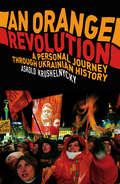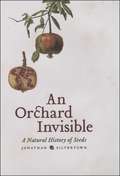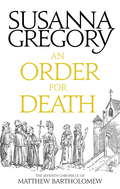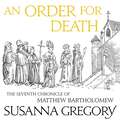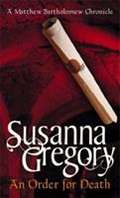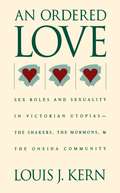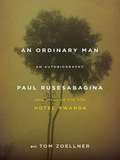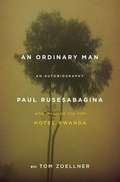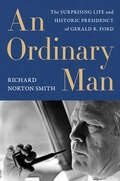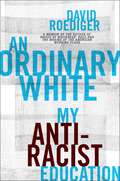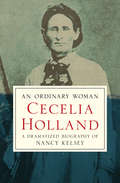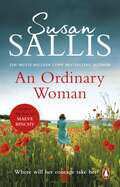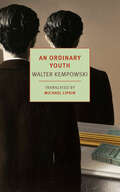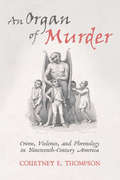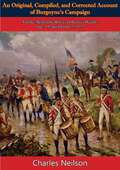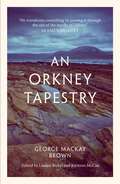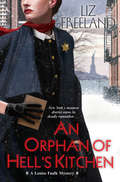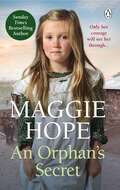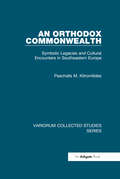- Table View
- List View
An Orange Revolution: A Personal Journey Through Ukrainian History
by Askold KrushnelnyckyIn December 2004, the world watched as hundreds of thousands of Ukrainians gathered to defy the results of a transparently rigged presidential election. The charismatic popular candidate, Viktor Yushchenko, had been poisoned and disfigured by his opponents. The security forces threatened violent repression. But the demonstrators stayed and, as international pressure grew, the corrupt old regime that had been supported by Putin's Kremlin was deposed. It was the most significant moment for Europe since the fall of the Berlin Wall.An Orange Revolution is the gripping account of this historic uprising and the events that led to it. Ukraine was treated roughly by the twentieth century, occupied by the Germans and annexed by the Soviets. It saw guerrilla fighting after the Second World War and dissent was crushed by successive Communist administrations. Its history has been one of corruption, power struggles, organised crime, but a resiliently optimistic population.Based on firsthand observation and interviews with major players and anonymous demonstrators alike, this is about a people who have forced a lasting change: judges who defied death threats, a murdered journalist, amateur musicians who composed an anthem for the people, and soldiers who staked their lives to back the opposition. An Orange Revolution also traces the story of the author's family, who paid a high price for speaking out. An Orange Revolution is a captivating book about a defining moment in European history.
An Orchard Invisible: A Natural History of Seeds
by Jonathan SilvertownThe story of seeds, in a nutshell, is a tale of evolution. From the tiny sesame that we sprinkle on our bagels to the forty-five-pound double coconut borne by the coco de mer tree, seeds are a perpetual reminder of the complexity and diversity of life on earth. With An Orchard Invisible, Jonathan Silvertown presents the oft-ignored seed with the natural history it deserves, one nearly as varied and surprising as the earth's flora itself.Beginning with the evolution of the first seed plant from fernlike ancestors more than 360 million years ago, Silvertown carries his tale through epochs and around the globe. In a clear and engaging style, he delves into the science of seeds: How and why do some lie dormant for years on end? How did seeds evolve? The wide variety of uses that humans have developed for seeds of all sorts also receives a fascinating look, studded with examples, including foods, oils, perfumes, and pharmaceuticals. An able guide with an eye for the unusual, Silvertown is happy to take readers on unexpected--but always interesting--tangents, from Lyme disease to human color vision to the Salem witch trials. But he never lets us forget that the driving force behind the story of seeds-- its theme, even-- is evolution, with its irrepressible habit of stumbling upon new solutions to the challenges of life. "I have great faith in a seed," Thoreau wrote. "Convince me that you have a seed there, and I am prepared to expect wonders." Written with a scientist's knowledge and a gardener's delight, An Orchard Invisible offers those wonders in a package that will be irresistible to science buffs and green thumbs alike.
An Order For Death: The Seventh Chronicle Of Matthew Bartholomew (Chronicles Of Matthew Bartholomew Ser. #7)
by Susanna GregoryBelievers in the theory of nominalism have set some Cambridge colleges at the throats of those who believe them to be heretics and Michael, the Senior Proctor, has his work cut out to keep the peace. When a nominalist is murdered during a riot Michael is certain he will easily find the killer amongst the Dominicans, but before he can get any sense out of them his junior proctor, Walcote, is found hanged and he discovers that his trusted ally had arranged secret meetings at the St Ragelund Convent between men who would not normally be seen together - and the nuns of St Ragelund are renowned for behaviour entirely inappropriate to their calling. Meanwhile Matthew Bartholomew learns that Michael, his lifelong friend, is in all probability the thief who relieved one of the anti-nominalist colleges of some of their most precious papers. If that charge were proved it would put paid to Michael's long term plans to become Master of Michaelhouse - but would he kill to protect himself? Unable to believe his colleague would be capable of such acts, Bartholomew knows the only way he can quiet his own conscience is to solve the murders himself.
An Order For Death: The Seventh Matthew Bartholomew Chronicle (Chronicles of Matthew Bartholomew #7)
by Susanna GregoryThe seventh chronicle in the Matthew Bartholomew series. It is a time of division and denomination at the great University. The Carmelites and the Dominicans are at theological loggerheads, so much so that the more fanatical members are willing to swap rational judgement for a deadlier form of debate. And no sooner is Carmelite friar Faricius found stabbed than a Junior Proctor is found hanging from the walls of the Dominican Friary.What was Faricius doing out when he had not been given permission to wander? How are the nuns at the nearby convent of St Radegund involved? And who is brokering trouble between Cambridge and its rival University at Oxford? The longer their enquiries go on, the more Bartholomew and Michael realise that the murders are less to do with high-minded academic principles, and more to do with far baser instincts.'A first-rate treat for mystery lovers' (Historical Novels Review)'Susanna Gregory has an extraordinary ability to conjure up a strong sense of time and place' (Choice)
An Order For Death: The Seventh Matthew Bartholomew Chronicle (Chronicles of Matthew Bartholomew #7)
by Susanna GregoryBelievers in the theory of nominalism have set some Cambridge colleges at the throats of those who believe them to be heretics and Michael, the Senior Proctor, has his work cut out to keep the peace. When a nominalist is murdered during a riot Michael is certain he will easily find the killer amongst the Dominicans, but before he can get any sense out of them his junior proctor, Walcote, is found hanged and he discovers that his trusted ally had arranged secret meetings at the St Ragelund Convent between men who would not normally be seen together - and the nuns of St Ragelund are renowned for behaviour entirely inappropriate to their calling. Meanwhile Matthew Bartholomew learns that Michael, his lifelong friend, is in all probability the thief who relieved one of the anti-nominalist colleges of some of their most precious papers. If that charge were proved it would put paid to Michael's long term plans to become Master of Michaelhouse - but would he kill to protect himself? Unable to believe his colleague would be capable of such acts, Bartholomew knows the only way he can quiet his own conscience is to solve the murders himself.
An Order for Death (Matthew Bartholomew Chronicles #7)
by Susanna GregoryBelievers in the theory of nominalism have set some Cambridge colleges at the throats of those who believe them to be heretics, and Brother Michael, the Senior Proctor, is struggling to keep the peace. When a nominalist is murdered during a riot, Michael is certain he will find the killer among the Dominicans-but before he can act, his junior proctor, Walcote, is found hanged. Meanwhile, Matthew Bartholomew discovers evidence that leads to Michael himself. Unable to believe his lifelong friend could be capable of such acts, Bartholomew knows that the only way he can quiet his own conscience is to solve the murders himself, and the cause of murder is once more on the mind of Matthew Bartholomew . . . It is a time of division and denomination at the great university. The Carmelites and Dominicans are at theological loggerheads, so much so that the more fanatical are willing to swap rational argument for a far deadlier form of debate. And no sooner is Carmelite friar Faricius found stabbed than a junior proctor is found hanging from the walls of the Dominican friary. Why was Faricius found outside his friary, when he was not permitted to leave? How are the nuns at St Radegund's involved? And who is negotiating between Cambridge and their great enemy, Oxford? The longer his inquiries go on, the more Matthew Bartholomew realises that the murders are less to do with high-minded principles, and more to do with far baser instincts.
An Ordered Love
by Louis J. KernAn Ordered Love is the first detailed study of sex roles in the utopian communities that proposed alternatives to monogamous marriage: The Shakers (1779-1890), the Mormons (1843-90), and the Oneida Community (1848-79).The lives of men and women changed substantially when they joined one of the utopian communities. Louis J. Kern challenges the commonly held belief that Mormon polygamy was uniformly downgrading to women and that Oneida pantagamy and Shaker celibacy were liberating for them. Rather, Kern asserts that changes in sexual behavior and roles for women occurred in ideological environments that assumed women were inferior and needed male guidance. An elemental distrust of women denied the Victorian belief in their moral superiority, attacked the sanctity of the maternal role, and institutionalized the dominance of men over women.These utopias accepted the revolutionary idea that the pleasure bond was the essence of marriage. They provided their members with a highly developed theological and ideological position that helped them cope with the ambiguities and anxieties they felt during a difficult transitional stage in social mores.Analysis of the theological doctrines of these communities indicates how pervasive sexual questions were in the minds of the utopians and how closely they were related to both reform (social perfection) and salvation (individual perfection). These communities saw sex as the point at which the demands of individual selfishness and the social requirements of self-sacrifice were in most open conflict. They did not offer their members sexual license, but rather they established ideals of sexual orderliness and moral stability and sought to provide a refuge from the rampant sexual anxieties of Victorian culture.Kern examines the critical importance of considerations of sexuality and sexual behavior in these communities, recognizing their value as indications of larger social and cultural tensions. Using the insights of history, psychology, and sociology, he investigates the relationships between the individual and society, ideology and behavior, and thought and action as expressed in the sexual life of these three communities. Previously unused manuscript sources on the Oneida Community and Shaker journals and daybooks reveal interesting and sometimes startling information on sexual behavior and attitudes.
An Ordinary Man
by Paul RusesabaginaThe remarkable life story of the man who inspired the film "Hotel Rwanda" Readers who were moved and horrified by "Hotel Rwanda" will respond even more intensely to Paul Rusesabaginas unforgettable autobiography. As Rwanda was thrown into chaos during the 1994 genocide, Rusesabagina, a hotel manager, turned the luxurious Hotel Milles Collines into a refuge for more than 1,200 Tutsi and moderate Hutu refugees, while fending off their would-be killers with a combination of diplomacy and deception. In "An Ordinary Man," he tells the story of his childhood, retraces his accidental path to heroism, revisits the 100 days in which he was the only thing standing between his guests and a hideous death, and recounts his subsequent life as a refugee and activist.
An Ordinary Man: An Autobiography
by Paul Rusesabagina Tom ZoellnerThis is the story of Paul Rusesabagina. He tells of the history of the Hutu and Tutsi people in Rwanda, why the strife between the two groups developed, and the part he played in the conflict, saving over a thousand people from almost certain death. Rusesabagina skillfully weaves the story of the Hutu-tutsi conflict with his efforts to save as many people as he could. this is the autobiography of the man portrayed in the award-winning movie entitled Hotel Rwanda.
An Ordinary Man: The Surprising Life and Historic Presidency of Gerald R. Ford
by Richard Norton Smith“Richard Norton Smith had brought a lifetime of wisdom, insight, and storytelling verve to the life of a consequential president—Gerald R. Ford. Ford’s is a very American life, and Smith has charted its vicissitudes and import with great grace and illuminating perspective. A marvelous achievement!” -- Jon MeachamFrom the preeminent presidential scholar and acclaimed biographer of historical figures including George Washington, Herbert Hoover, and Nelson Rockefeller comes this eye-opening life of Gerald R. Ford, whose presidency arguably set the course for post-liberal America and a post-Cold War world.For many Americans, President Gerald Ford was the genial accident of history who controversially pardoned his Watergate-tarnished predecessor, presided over the fall of Saigon, and became a punching bag on Saturday Night Live. Yet as Richard Norton Smith reveals in a book full of surprises, Ford was an underrated leader whose tough decisions and personal decency look better with the passage of time.Drawing on hundreds of interviews and thousands of documents, Smith recreates Ford’s hardscrabble childhood in Michigan, his early anti-establishment politics and lifelong love affair with the former Betty Bloomer, whose impact on American culture he predicted would outrank his own. As president, Ford guided the nation through its worst Constitutional crisis since the Civil War and broke the back of the most severe economic downturn since the Great Depression—accomplishing both with little fanfare or credit (at least until 2001 when the JFK Library gave him its prestigious Profile in Courage Award in belated recognition of the Nixon pardon).Less coda than curtain raiser, Ford's administration bridged the Republican pragmatism of Eisenhower and Nixon and the more doctrinaire conservatism of Ronald Reagan. His introduction of economic deregulation would transform the American economy, while his embrace of the Helsinki Accords hastened the collapse of the Soviet Union.Illustrated with sixteen pages of black-and-white photos, this definitive biography, a decade in the making, will change history’s views of a man whose warning about presidential arrogance (“God help the country”) is more relevant than ever.
An Ordinary White: My Antiracist Education
by David RoedigerA prize-winning historian details his intellectual and political evolution Written by the author of the landmark book The Wages of Whiteness and one of the key figures in the critical study of race and racism in America, An Ordinary White is the life story of the historian and radical American writer, David Roediger.With wry wit and keen observation, Roediger chronicles his intellectual and political evolution from growing up in his southern Midwest sundown town to becoming a leading figure in working-class history and Whiteness studies. A latecomer to the New Left, a longtime figure in the Chicago Surrealist Group, and part of the collective reviving of the Charles Kerr Company—the world’s oldest socialist publisher—Roediger captures events and characters absent from standard histories of the left as well as such icons of resistance as Studs Terkel, Noel Ignatiev, Angela Davis, Toni Morrison, and C. L. R. James.A direct response to the venom, effectiveness, and durability of white nationalist attacks on Critical Race Theory, this memoir describes Roediger’s youth as “ordinary,” both in its unfolding in a lower-middle-class family of southern Illinois workers and in the depth of white racism he was taught. He considers himself “saved” by social movements of his time, including those of labor, against empire, and, above all, the Black Freedom struggle. Public education, dissenting currents in Catholicism, knowledge of the importance of good union jobs, and generative impulses in sports and music helped make his salvation stick.Roediger’s knowledge of white advantage came from his personal everyday experiences, but among people ordinary enough to guard against the mistaken notion that poor and working-class whites are uniquely the culprits of white nationalism. Importantly he argues against the characterization of them as intractably racist or incapable of understanding the advantages of whiteness. A teacher in state universities for forty years, Roediger has tirelessly fought against their being hollowed out by corporate values and austerity. In An Ordinary White, he writes movingly of these experiences and what we have lost in our institutions whose soaring rhetoric outstrips any ability to defend education or racial justice.
An Ordinary Woman: A Dramatized Biography of Nancy Kelsey
by Cecelia HollandThe remarkable story of the courageous young pioneer who endures the hardships of the wilderness to become the first American woman to enter California A hard life in the Missouri wilderness has made young Nancy Roberts Kelsey strong, fearless, and ready for anything. In the year 1841, the seventeen-year-old wife and mother joins her husband, Ben, and with an infant in her arms, sets off in pursuit of the dream called California. Halfway across the continent, with the worst of the journey still to come, most of their party opts for the safer passage to Oregon, but the Kelseys and their friends choose a more direct route to the western coast—a fateful decision that will lead them across the Great Basin and over the Sierra Nevadas, through confrontations with native tribes and merciless weather. But a different sort of peril awaits them at farthest edge of the frontier from the powerful Mexican dons who view all new arrivals as threats to their sovereignty—setting a seemingly ordinary woman on an extraordinary path that will ultimately change the course of American history. Based in part on the actual letters and writings of Nancy Kelsey, An Ordinary Woman is a stunning tale of courage, determination, and grand adventure that celebrates the remarkable life and achievements of a little-known but essential character from the pages of history—yet another masterful blending of fiction and fact from Cecelia Holland, one of America&’s premier historical novelists.
An Ordinary Woman: An utterly captivating and uplifting story of one woman’s strength and determination…
by Susan SallisFrom the Sunday Times bestselling author Susan Sallis comes a wonderfully evocative novel, perfect for fans of Maeve Binchy, Fiona Valpy and Rosamunde Pilcher.READERS ARE LOVING AN ORDINARY WOMAN! "A remarkable story of love, life, pleasures and hazards. Strong characters who define this story. Excellent read and would strongly recommend Susan Sallis" -- 5 STARS"The storyline was captivating from the start..." - 5 STARS"This book held me from the first page to the last!" - 5 STARS"Very good story, loved every minute..." - 5 STARS***********************************************WHEN NEEDED, WILL SHE BE ABLE TO RISE TO THE CHALLENGE?1945, Connecticut. A scandal breaks which forces a baffled Rose, aged four, and her mother to leave America and return home to England.The following May, a sister is born - Joanna or 'Jon'. Rose and Jon are like chalk and cheese. Jon is vivacious, fun, impetuous, rash and persuasive. Rose is reserved, steady, sure, reliable and...ordinary. It is her lot in life to hold the family together through times of tragedy and emotional upheaval.But, when, years later, Jon sets events in motion which send Rose across the Atlantic again and into the most extraordinary event of her life, can she ever be thought of as ordinary again?
An Ordinary Youth
by Walter KempowskiAn Ordinary Youth is a novel drawn directly from the author's boyhood in Nazi Germany. Nine-year-old Walter's family is moving house when the novel opens, but Walter's main concerns are his tin soldiers and his older brother&’s jazz records, his father&’s fluctuating moods, and his mother&’s ministrations and anxieties. While Walter is absorbed by his private life, the extraordinary accumulation of contemporary idioms that accompany his point of view—dialogue, song, literary quotations, commercials, and political slogans—tell a different story. Through this echo chamber of voices, Kempowski shows a hugely turbulent and murderously intolerant nation racing toward disaster. An immediate bestseller when it was first published in Germany in 1971 (as Tadellöser & Wolff) and the best known of Kempowski's novels in Germany, An Ordinary Youth is now available in English for the first time.
An Organ of Murder: Crime, Violence, and Phrenology in Nineteenth-Century America (Critical Issues in Health and Medicine)
by Courtney E. ThompsonAn Organ of Murder explores the origins of both popular and elite theories of criminality in the nineteenth-century United States, focusing in particular on the influence of phrenology. In the United States, phrenology shaped the production of medico-legal knowledge around crime, the treatment of the criminal within prisons and in public discourse, and sociocultural expectations about the causes of crime. The criminal was phrenology’s ideal research and demonstration subject, and the courtroom and the prison were essential spaces for the staging of scientific expertise. In particular, phrenology constructed ways of looking as well as a language for identifying, understanding, and analyzing criminals and their actions. This work traces the long-lasting influence of phrenological visual culture and language in American culture, law, and medicine, as well as the practical uses of phrenology in courts, prisons, and daily life.
An Original, Compiled, and Corrected Account of Burgoyne's Campaign: And the Memorable Battles of Bemis's Heights, Sept. 19, and October 7, 1777
by Charles NeilsonCharles Neilson’s "An Original, Compiled, and Corrected Account of Burgoyne's Campaign: And the Memorable Battles of Bemis's Heights, Sept. 19, and October 7, 1777" offers a detailed and meticulously researched chronicle of one of the most pivotal moments in the American Revolutionary War. This comprehensive work provides a vivid portrayal of General John Burgoyne’s campaign and the critical battles that culminated in the British surrender at Saratoga.Neilson’s account is distinguished by its thorough compilation and correction of contemporary sources, including official reports, personal letters, and eyewitness testimonies. His narrative begins with the strategic objectives of Burgoyne’s invasion from Canada and follows the intricate maneuvers, logistical challenges, and key engagements that defined the campaign.Central to the book are the Battles of Bemis Heights, fought on September 19 and October 7, 1777. Neilson provides a gripping and detailed analysis of these encounters, highlighting the tactical decisions, heroic actions, and intense combat that characterized these crucial confrontations. His descriptions bring to life the valor and resilience of both the American and British forces, offering readers a front-row seat to the drama and chaos of battle.Neilson’s work is more than just a military history; it captures the broader significance of Burgoyne’s campaign within the context of the Revolutionary War. He explores the strategic implications of the American victory at Saratoga, which not only marked a turning point in the conflict but also persuaded France to enter the war on the side of the American colonies, altering the course of history.Through Neilson’s detailed and compelling narrative, this book stands as a testament to the strategic brilliance and indomitable spirit that defined a critical chapter in America’s fight for independence. It remains a definitive reference on Burgoyne’s campaign and the monumental battles that shaped the outcome of the Revolutionary War.
An Orkney Tapestry
by George MacKay BrownFirst published in 1969, An Orkney Tapestry, George Mackay Brown's seminal work, is a unique look at Orkney through the eye of a poet. Originally commissioned by his publisher as an introduction to the Orkney Islands, Brown approached the writing from a unique perspective and went on to produce a rich fusion of ballad, folk tale, short story, drama, and environmental writing. The book, written at an early stage in the author’s career, explores themes that appear in his later work and was a landmark in Brown’s development as a writer. Above all, it is a celebration of Orkney's people, language and history. This edition reproduces Sylvia Wishart’s beautiful illustrations, commissioned for the original hardback. Made available again for the first time in over 40 years, this new edition sits alongside Nan Shepherd’s The Living Mountain as an important precursor of environmental writing by the likes of Kathleen Jamie, Robert Macfarlane, Malachy Tallack and, most recently, Amy Liptrot.
An Orphan of Hell's Kitchen (A Louise Faulk Mystery #3)
by Liz FreelandIn 1914, Hell’s Kitchen is an apt name for New York City’s grittiest neighborhood, as one of the city’s first policewomen, Louise Faulk, is about to discover when the death of a young prostitute leads her on a grim journey through the district’s darkest corners . . . Filthy, dangerous, and deadly—Hell’s Kitchen is no place for a lady, but Louise Faulk is no ordinary woman. The amateur investigator turned rookie policewoman is investigating the death of young prostitute, Ruthie, who leaves behind a baby boy. Although detectives are quick to declare it a suicide, Louise is less certain after she discovers clues implying murder while attempting to find a caretaker for Ruthie’s orphaned son. Uncovering the truth won’t be easy, especially since Louise is struggling to make a name for herself amid the boys’ club of the New York City Police Department. But Ruthie’s case keeps tugging at Louise, luring her beyond the slums’ drawn curtains and tenement doors, into an undercover investigation that often seems to conceal more than it reveals. Louise is convinced Ruthie’s secrets got her killed, but can she prove it before they catch up to her too?
An Orphan's Dream (The Shaw Family in Liverpool #4)
by Judy SummersAS RECOMMENDED BY LYN ANDREWSWill her secret past threaten her dreams?Liverpool, 1864. When Jemima Jenkins's beloved Pa passes away leaving her orphaned, she is cruelly thrown out of her lodgings and dismissed from her cherished job as a schoolmistress.Offered a temporary home with her best friend Betty, Jemima is determined to avoid the workhouse and get back on her feet, even daring to hope about one day opening her own school for poor children.But when she uncovers a mysterious letter, revealing shocking revelations about her past, Jemima's plans are cast into doubt.Will Jemima's dreams come true or will the secret about who she really is jeopardise her one chance at finding happiness?An enthralling and empowering Victorian saga, perfect for fans of Maggie Ford, Lyn Andrews, and Rosie Goodwin. PRAISE FOR JUDY SUMMERS:'I thoroughly enjoyed this book . . . The characters are well drawn and believable' Lyn Andrews'Fascinating insights into Victorian Liverpool and a heart-warming story make for an inspiring read' Mollie WaltonREADERS LOVE JUDY SUMMERS!'I was enthralled throughout . . . an absolute rollercoaster of emotions''I simply could not put it down!''Judy Summers has left an impression on me, and my is it a good one!'
An Orphan's Dream (The Shaw Family in Liverpool #4)
by Judy SummersAS RECOMMENDED BY LYN ANDREWSWill her secret past threaten her dreams?Liverpool, 1864. When Jemima Jenkins's beloved Pa passes away leaving her orphaned, she is cruelly thrown out of her lodgings and dismissed from her cherished job as a schoolmistress.Offered a temporary home with her best friend Betty, Jemima is determined to avoid the workhouse and get back on her feet, even daring to hope about one day opening her own school for poor children.But when she uncovers a mysterious letter, revealing shocking revelations about her past, Jemima's plans are cast into doubt.Will Jemima's dreams come true or will the secret about who she really is jeopardise her one chance at finding happiness?An enthralling and empowering Victorian saga, perfect for fans of Maggie Ford, Lyn Andrews, and Rosie Goodwin. PRAISE FOR JUDY SUMMERS:'I thoroughly enjoyed this book . . . The characters are well drawn and believable' Lyn Andrews'Fascinating insights into Victorian Liverpool and a heart-warming story make for an inspiring read' Mollie WaltonREADERS LOVE JUDY SUMMERS!'I was enthralled throughout . . . an absolute rollercoaster of emotions''I simply could not put it down!''Judy Summers has left an impression on me, and my is it a good one!'
An Orphan's Dream (The Shaw Family in Liverpool #4)
by Judy SummersAS RECOMMENDED BY LYN ANDREWSWill her secret past threaten her dreams?Liverpool, 1864. When Jemima Jenkins's beloved Pa passes away leaving her orphaned, she is cruelly thrown out of her lodgings and dismissed from her cherished job as a schoolmistress.Offered a temporary home with her best friend Betty, Jemima is determined to avoid the workhouse and get back on her feet, even daring to hope about one day opening her own school for poor children.But when she uncovers a mysterious letter, revealing shocking revelations about her past, Jemima's plans are cast into doubt.Will Jemima's dreams come true or will the secret about who she really is jeopardise her one chance at finding happiness?An enthralling and empowering Victorian saga, perfect for fans of Maggie Ford, Lyn Andrews, and Rosie Goodwin. PRAISE FOR JUDY SUMMERS:'I thoroughly enjoyed this book . . . The characters are well drawn and believable' Lyn Andrews'Fascinating insights into Victorian Liverpool and a heart-warming story make for an inspiring read' Mollie WaltonREADERS LOVE JUDY SUMMERS!'I was enthralled throughout . . . an absolute rollercoaster of emotions''I simply could not put it down!''Judy Summers has left an impression on me, and my is it a good one!'
An Orphan's Secret
by Maggie HopeA gripping saga from the Sunday Times bestselling author of The Coal Miner's DaughterLife is a long, tough struggle for Meg Maddison…Growing up caring for her brothers after the death of their mother, it is only her indomitable spirit that gets her through the hard times. And when she marries and starts a family of her own, it seems as if the hardships are over.But the return of a darkly menacing figure from her past threatens to destroy all she has fought for…
An Orphan's Wish (Blessed St Hilda’s Orphanage)
by Elizabeth GillWill she be able to keep her family together?Wolsingham, 1900After the death of their parents, Connie, Dom, Leo, and Pearl find themselves all alone in the world. They return to England and the only family they have left, their grandparents, Joshua and Flo Butler. The Butlers hadn't seen their only son Michael in twenty years, since he ran away with Rosa, the young woman who stole his heart. An unforgivable crime in their eyes. The orphans, expecting a warm welcome after their long journey from Japan, are surprised to find that Flo and Joshua want nothing to do with any child of Rosa's. When Flo falls gravely ill, the Butlers have no choice but to accept the help of the children they turned away. With the help of their new community can the orphans repair what little family they have left and perhaps, even find happiness and love for themselves . . . ?______________________'Original and evocative - a born storyteller' - Trisha Ashley 'A wonderful book, full of passion, pain, sweetness, twists and turns. I couldn't put it down' - Sheila Newberry 'Elizabeth Gill writes with a masterful grasp of conflicts and passions' - Leah Fleming
An Orphan's Wish (Blessed St Hilda’s Orphanage)
by Elizabeth GillWill she be able to keep her family together?Wolsingham, 1900After the death of their parents, Connie, Dom, Leo, and Pearl find themselves all alone in the world. They return to England and the only family they have left, their grandparents, Joshua and Flo Butler. The Butlers hadn't seen their only son Michael in twenty years, since he ran away with Rosa, the young woman who stole his heart. An unforgivable crime in their eyes. The orphans, expecting a warm welcome after their long journey from Japan, are surprised to find that Flo and Joshua want nothing to do with any child of Rosa's. When Flo falls gravely ill, the Butlers have no choice but to accept the help of the children they turned away. With the help of their new community can the orphans repair what little family they have left and perhaps, even find happiness and love for themselves . . . ?______________________'Original and evocative - a born storyteller' - Trisha Ashley 'A wonderful book, full of passion, pain, sweetness, twists and turns. I couldn't put it down' - Sheila Newberry 'Elizabeth Gill writes with a masterful grasp of conflicts and passions' - Leah Fleming
An Orthodox Commonwealth: Symbolic Legacies and Cultural Encounters in Southeastern Europe (Variorum Collected Studies #891)
by Paschalis M. KitromilidesThis collection brings together fifteen studies on the survival and adaptation of the Orthodox religious and cultural tradition in the societies of Southeastern Europe after the fall of Constantinople, a world so often misunderstood and misinterpreted. This problem of cultural history is examined in a diversity of contexts and on multiple levels of analysis in order to elucidate issues of broader concern to social theory such as the fluidity and dynamic character of identity, the intricate encounter of religion and politics and the challenge of secular world views such as the Enlightenment and nationalism to traditional religious outlooks. The author argues consistently against all forms of reductionism, converses at length with the sources in order to pose questions to conventional views and invites the historical imagination to recover and understand a world submerged by the nationalist interpretation of the past. This task involves the recovery of the geographical pluralism that made Orthodox culture a truly transnational phenomenon. The collection accordingly brings into focus both the epicentres of Orthodox culture and symbolism such as Mt Athos and Constantinople, but also its hinterlands in Asia Minor and the Balkans.
